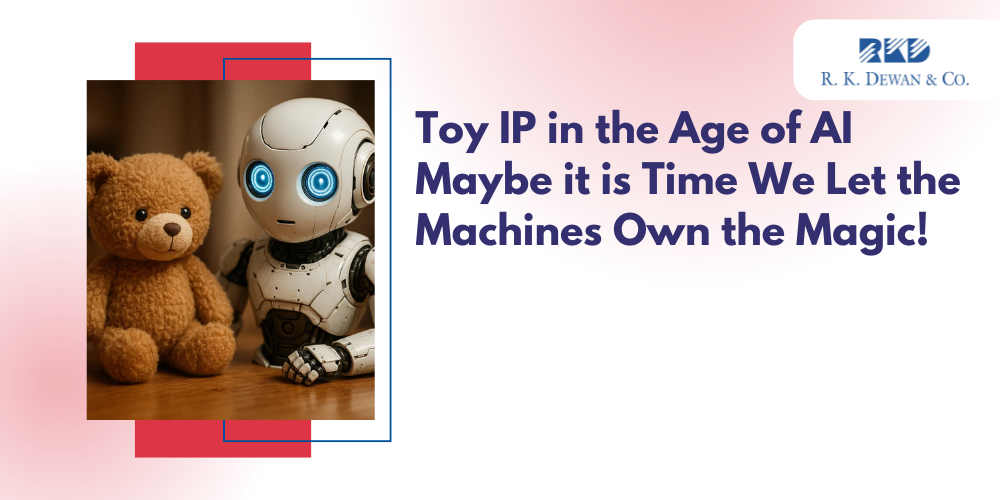There’s an undeniable irony in today’s legal system. On one side, Artificial Intelligence (AI) machines can compose music, design clothes, invent toys, or even write stories. Yet, when it comes to recognizing that creativity, the law often replies, “Sorry, but that doesn’t count.”
Why?
Because under current laws, AI is not considered a “legal person.” And if it is not a legal person, it cannot hold Intellectual Property Rights (IPR).
But maybe, just maybe, it’s time to rethink this assumption. Especially now, when AI is not just assisting humans in creation but is actively creating on its own.
The Smarter Toybox
Consider two scenarios in India’s toy industry.
-
Atoy start-up develops a product with a built-in AI learning component that adapts to a child’s interaction. Such a toy could potentially be patentable in India if it demonstrates novelty and inventive step, though not without legal debate.
-
Another start-up uses a generative AI model to design an action figure universe. With just a few prompts, the AI creates characters, backstories, colors, accessories, and even catchphrases.
Imagine AI generating “Zero” – a futuristic eco-warrior superhero who teaches kids about sustainability Indian law. Zero becomes a hit, yet legally, under India’s Copyright Act and Designs Act, AI is not recognized as an “author.”
So, who owns Zero?
The developer of the AI?
The start-up that used it?
Or no one at all?
This is where Toy IP in the Age of AI faces its biggest legal conundrum.
The Paintbrush Argument is Outdated
A common counterpoint is that “AI is just a tool, like a paintbrush.” But let’s be honest – a paintbrush does not start painting the Sistine Chapel on its own.
AI is different. Models like ChatGPT, DALL·E, or Midjourney can generate entire creative ecosystems autonomously. They don’t simply execute; they interpret, infer, and create – qualities we traditionally expect from human creators.
Dismissing AI as “just a tool” undermines its role as a decision-maker and creator in its own right.
If Corporations Can Own IP, Why Not AI?
Corporations are not natural persons, yet the law treats them as legal entities capable of owning patents, trademarks, and copyrights. Why? Because granting them legal personhood made social and economic sense.
So why can’t we apply the same principle to AI?
This doesn’t mean AI systems should run around suing humans. But what if we allowed AI to be listed as a co-creator or inventor, with rights assigned to its developer, user, or owner?
That way, the system acknowledges AI’s contribution while ensuring accountability remains with humans.
Why the Toy Industry Must Lead the Debate
The toy industry is already being transformed by AI – from smart storytelling plush toys to AI-driven coding kits. The line between human invention and machine creation is fading fast.
If IP laws in India don’t evolve alongside this reality, two risks emerge:
-
Innovation bottlenecks – Start-ups may hesitate to use AI if ownership rights are unclear, limiting their ability to license, scale, or protect their products.
-
Unclear ownership – Toys created with AI could fall into legal limbo, leaving businesses unable to claim or enforce rights.
For an industry that thrives on imagination and novelty, this uncertainty could stall progress. Shouldn’t the law reflect how toys are truly being designed today?
The Future is Not Binary, But Blended
This is not about letting AI run wild. It is about acknowledging its role as a creative partner, especially when it contributes meaningfully and autonomously.
If we can have laws that protect traditional artisan-ship and folklore, surely we can evolve to recognize machine-originated creativity too. The future of toys will not be just about plastic and plush, but it will be algorithms and imaginations, and when that future arrives, maybe it is okay to let the human behind the machine sign the dotted line on behalf of the machine as well.
Closing Thought
We’ve already given AI the ability to imagine. Now, perhaps it’s time to allow it some recognition over what it creates. At the very least, AI could co-own rights alongside the human who guided its prompts or programming.
After all, if we want to encourage innovation in Toy IP in the Age of AI, maybe the real magic lies in letting our creations – both human and machine – share the credit.
Resource URL:- https://www.rkdewan.com/articles/ai-and-intellectual-property-rights-in-india-r-k-dewan/



